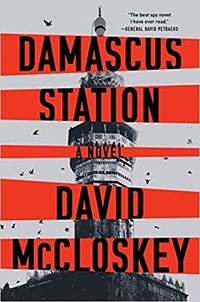Damascus Station by David McCloskey
 Wednesday, October 6, 2021 at 7:04AM
Wednesday, October 6, 2021 at 7:04AM 
Publsihed by W. W. Norton & Company on October 5, 2021
Damascus Station does what a spy thriller should do. It engages the imagination with tradecraft, appeals to the intellect with political intrigue, and excites the senses with action scenes. Some of the action takes place in the bedroom (or other convenient locations). More violent scenes play out in the streets and buildings of Damascus.
Much of the story takes place in Syria, where a brutal dictatorship is fighting a war against rebels. Samuel Joseph works for the CIA. His Levantine Arabic is flawless. He begins the novel in Damascus, where he has been sent to exfiltrate an asset, as well as Val Owens, the asset’s handler who is in Syria under diplomatic cover. The mission does not go well, particularly for Val.
A well-educated woman named Miriam, a Syrian general’s daughter, secretly opposes the government that employs her. Miriam’s cousin Razan makes no effort to hide her disdain for the Syrian president. She gets away with it because her father has a position in the government that allows him to shield her.
Sam is sent to Paris, where Miriam is attempting to coerce a brave Syrian woman into returning to Syria and renouncing her criticism of the Syrian regime. Miriam must threaten harm to the woman’s family to carry out her mission, threats that cause her to despise herself. Sam’s task is to recruit Miriam as a double agent for the CIA. The task is easy to accomplish, both because Miriam hates the ruling regime and because she feels an immediate sexual attraction to Sam. The rules prohibit Sam from acting on that attraction, but rules have never stopped fictional spies from hopping into bed with assets. Sam puts his career at risk and, as is the custom in novels of this nature, falls in love with Miriam.
Miriam is the kind of character a reader might love, as well. She’s intelligent, a fierce warrior, and willing to take risks to fight the leaders she serves. Sam is your prototypical spy, stalwart and loyal and an all-around good guy apart from his inability to keep it in his pants. My favorite character might be the tough chief of station in Damascus. She’s vulgar, lethal with a shotgun, and proclaims herself (with some justification) to be the Angel of Death.
The plot takes Sam to Damascus, where he follows Miriam as her handler, using the usual diplomatic cover for his spying. Spy novels are all about betrayal, and the time comes when Sam must question whether Miriam is playing him. That’s the kind of plot point that makes espionage novels so addictive.
Word gets the US that the Syrian president intends to use sarin gas to wipe out a city in rebellion. That’s a step too far for the US, as is the capture and beheading of an American. The US intends a targeted assassination in retribution for the murder and selective bombing to prevent the use of sarin. The story eventually brings the US and Syria to the brink (or slightly over the brink) of war. By the end, Sam and Miriam are both in peril. Quick thinking and sacrifice offers the only hope of averting disaster.
The story features the usual tradecraft — a good thing, because tradecraft establishes a spy novel’s identity — including dead drops and (perhaps too many) surveillance detection routes, all taught to Miriam in a frenzy. The theme of a spy breaking the rules by getting sexually involved with a source that he’s running is familiar, but it’s a credible theme that works well in the context of the story. The action scenes in the novel’s second half justify the novel’s categorization as a thriller. The balance between action, political intrigue, and relationship drama is just about perfect. And the ending, without being artificially happy, is at least hopeful.
RECOMMENDED
 TChris |
TChris |  Post a Comment |
Post a Comment |  David McCloskey,
David McCloskey,  spy in
spy in  Thriller
Thriller